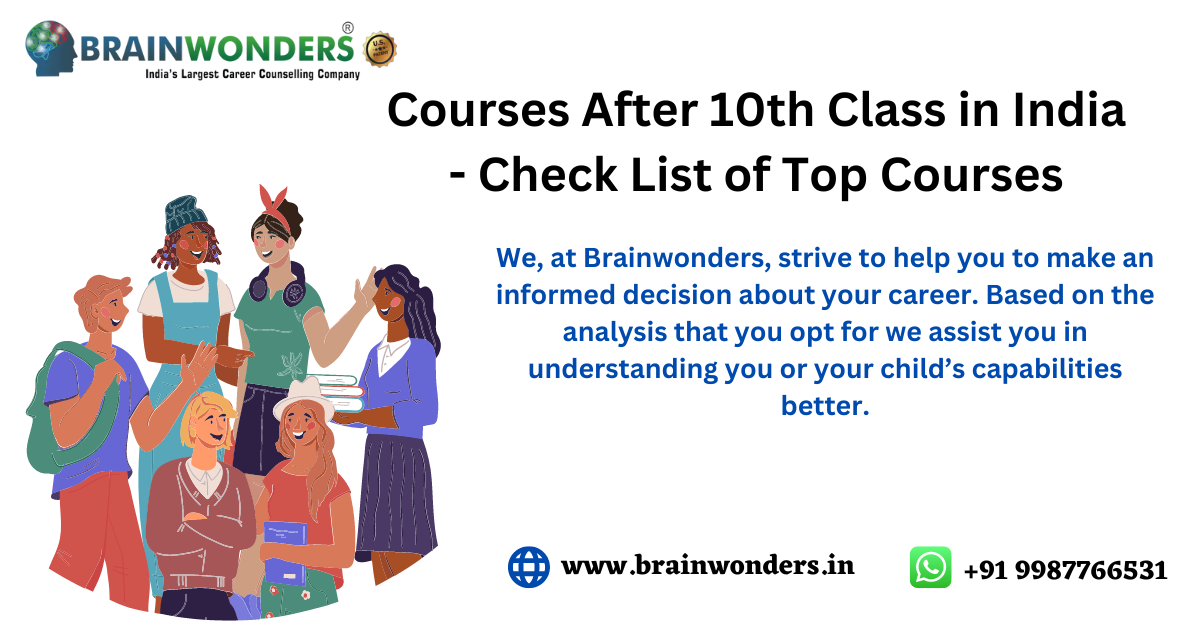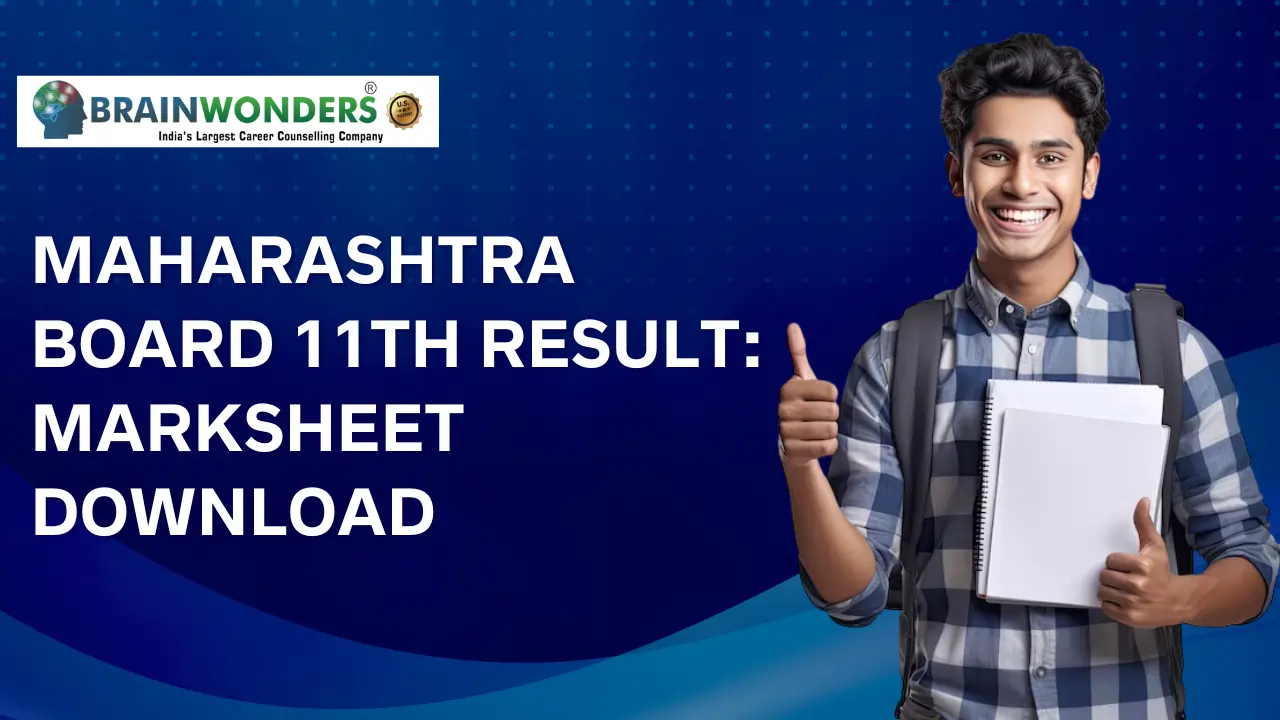

Take Brainwonders Career Test and make the right decisions for your college and course ahead
Let your unique personality, strengths, and traits guide to make the best decision of your life!
Blog
09 February,2024 | By Brainwonders

After completing the 10th boards, there are several options available for further studies, which include:
It is essential to identify your interests and strengths before choosing to pursue further studies. You can seek guidance from your parents, teachers, and career counsellors to make an informed decision.
After the 10th, several courses are available in India that students can pursue to build a successful career. Here are some of the top courses:
Students interested in pursuing a career in Science can opt for Science Stream in 11th and 12th. After completing 12th in Science, they can opt for courses like engineering, medicine, biotechnology, pharmacy, agriculture, etc.
Students interested in finance, accounting, economics, and business can opt for Commerce Stream in 11th and 12th. After completing 12th in Commerce, they can opt for courses like B.Com, BBA, CA, CS, CMA, etc.
Students interested in humanities, social sciences, and liberal arts can opt for Arts Stream in 11th and 12th. After completing 12th in Arts, they can opt for courses like BA, BSW, BFA, LLB, etc.
Students wanting to specialise in a particular field can opt for diploma courses after the 10th. Some popular diploma courses include Diploma in Engineering, Pharmacy, Hotel Management, etc.
Students who want to learn a specific skill can opt for vocational courses after the 10th. Some popular vocational courses include Computer Hardware and Networking, Web Designing, Fashion Designing, Beauty and Wellness, etc.
Students who want to save time and pursue both graduation and post-graduation together can opt for integrated courses after the 10th. Some popular integrated courses include BBA+MBA and B.Tech+M.Tech, etc.
Choosing a course that aligns with your interests, strengths, and career goals is essential. You can seek guidance from your parents, teachers, and career counsellors to make an informed decision.
Studying short-term courses after the 10th can have several benefits for students. Here are a few reasons why:
Short-term courses can help students develop new skills or improve existing ones. These courses provide practical computer programming, web development, photography, or graphic design training, which can enhance their employability and career prospects.
Short-term courses can also help students gain knowledge and skills in a specific field, enhancing their chances of getting hired for a job or advancing in their current careers. Some courses also provide industry certifications, which can further boost their job prospects.
Short-term courses can be an excellent way for students to explore their interests in a particular field before committing to a full-time degree program. This can help them make informed decisions about their future career paths.
Short-term courses are often flexible and can be completed online or in person, depending on the student's preference. This flexibility can allow students to balance their studies with other commitments like work or family.
Overall, studying short-term courses after the 10th can benefit students looking to enhance their skills and career prospects and explore their interests.
| Class 11th and 12th | Diploma Courses | Polytechnic Courses |
|
|
| Paramedical courses | ITI courses | Vocational courses |
|
|
|
The best course after the 10th Standard depends on the student's interests, skills, and career aspirations. Here are a few options that students can consider:
This is a popular course for students interested in pursuing engineering careers. The course is usually three years, providing practical mechanical, civil, electrical, or computer engineering training.
This course provides practical training in computer applications, including programming languages, software development, and database management. It is an excellent course for students interested in pursuing a career in the IT industry.
This course provides training in online marketing strategies, including social media, email marketing, search engine optimisation, and content marketing. It is a good option for students interested in pursuing a career in marketing or advertising.
This course provides training in hospitality management, including food and beverage services, housekeeping, front office operations, and event management. It is an excellent course for students interested in pursuing a career in the hospitality industry.
This course provides training in fashion design, including garment construction, textile design, and fashion merchandising. It is a good option for students interested in pursuing a career in the fashion industry.
This course provides training in medical laboratory techniques, including sample collection, testing, and analysis. It is an excellent course for students interested in pursuing a career in the healthcare industry.
These are just a few courses students can consider after the 10th Standard. Researching and choosing a course that aligns with their interests and career aspirations is important.
After completing the 10th Standard, students can choose a stream that aligns with their interests and career aspirations. The three primary streams available for students are:
Science Stream: Students interested in Science and technology can opt for the Science stream. This stream includes subjects like Physics, Chemistry, Biology, and Mathematics, and it provides a strong foundation for students who want to pursue careers in engineering, medicine, research, or technology.
Choosing a stream that aligns with the student's interests, skills, and career aspirations is essential. It is also important to research and understands the career opportunities and further education options available in each stream to make an informed decision.
Polytechnic courses are technical education programs that provide practical training and skills in various fields. These courses are designed to prepare students for careers in engineering, technology, and other technical fields. Polytechnic colleges and institutes offer polytechnic courses that can be pursued after completing the 10th or 12th Standard. Here are some popular polytechnic courses:
Diploma in Engineering: This is a three-year course that provides practical training in various fields of engineering, including mechanical, civil, electrical, electronics, computer, and chemical engineering.
Polytechnic courses provide students with practical skills and knowledge that can be applied directly to their careers. They also offer opportunities for further education and career advancement. Researching and choosing a polytechnic course that aligns with the student's interests and career aspirations is important.
Paramedical courses are healthcare education programs that provide practical training and skills in various healthcare fields. These courses are designed to prepare students for careers in healthcare that do not require a medical degree. Here are some popular paramedical courses:
Diploma in Medical Laboratory Technology (DMLT): This is a two-year course that provides practical training in medical laboratory technology, including pathology, microbiology, and biochemistry.
Paramedical courses provide students with practical skills and knowledge that can be applied directly to their careers in healthcare. They offer opportunities for further education and career advancement in various healthcare fields. Researching and choosing a paramedical course that aligns with the student's interests and career aspirations is important.
Industrial Training Institutes (ITIs) are technical education institutions that offer vocational training programs in various trades. These programs are designed to provide practical skills and knowledge that can be applied directly to the workplace. Here are some popular ITI courses:
ITI courses provide students with practical skills and knowledge that can be applied directly to the workplace. They offer opportunities for employment in various industries, including manufacturing, construction, and automotive. ITI graduates can also pursue further education and training in their chosen field, including apprenticeships and certification programs. Researching and choosing an ITI course that aligns with the student's interests and career aspirations is important.
Vocational courses are education programs that provide practical training and skills in various fields of work. These courses are designed to prepare students for careers that require specific vocational skills and knowledge. Here are some popular vocational courses:
Vocational courses provide students with practical skills and knowledge that can be applied directly to the workplace. They offer opportunities for self-employment and career advancement in various industries. Vocational courses are an excellent option for students who prefer hands-on learning and want to pursue a career that aligns with their interests and passions. Researching and choosing a vocational course that aligns with the student's interests and career aspirations is important.
Career counselling provides guidance and assistance to individuals who need clarification or clarification about their career choices. It involves assessing their skills, interests, personality traits, and values to help them make informed decisions about their career paths.
Here are some steps involved in the career counselling process:
Career counselling can be provided by trained professionals like career counsellors, psychologists, or coaches. They use tools like aptitude tests, personality tests, and career assessments to guide and support individuals.
After completing the 10th Standard, students have several options depending on their interests and career goals. Here are some common next steps after the 10th:
Students must choose a path that aligns with their interests, strengths, and career goals. Students can seek guidance from their teachers, parents, or career counsellors to make an informed decision.
It is important to understand that every field of study is inherently easy and challenging. The difficulty level in any field depends on a student's aptitude, interest, and willingness to put in the required effort and hard work. However, some courses and fields may be easier to pursue after 10th compared to others, depending on a student's aptitude and interests.
For example, suppose a student is interested in technical skills and hands-on learning. Vocational or ITI courses may be easier because they provide practical training and job-specific skills. Similarly, if a student has an aptitude for mathematics and Science, then pursuing a science stream in higher secondary education may be relatively easier for them.
It is important to remember that pursuing a course or field that aligns with one's interests and strengths can make learning easier and more enjoyable. Students should choose a field of study they are passionate about and willing to work hard for rather than solely focusing on its perceived difficulty level.
In all careers, guidance is required today as all the streams have extended subjects to choose from and not all subjects require the same aptitude. So students need to take career guidance as it will help them choose the right career and will help them excel in the future. And for that, you do not need to browse through other websites because Brainwonders career counselling team is always ready at your service.
Take Brainwonders Career Test and make the right decisions for your college and course ahead


